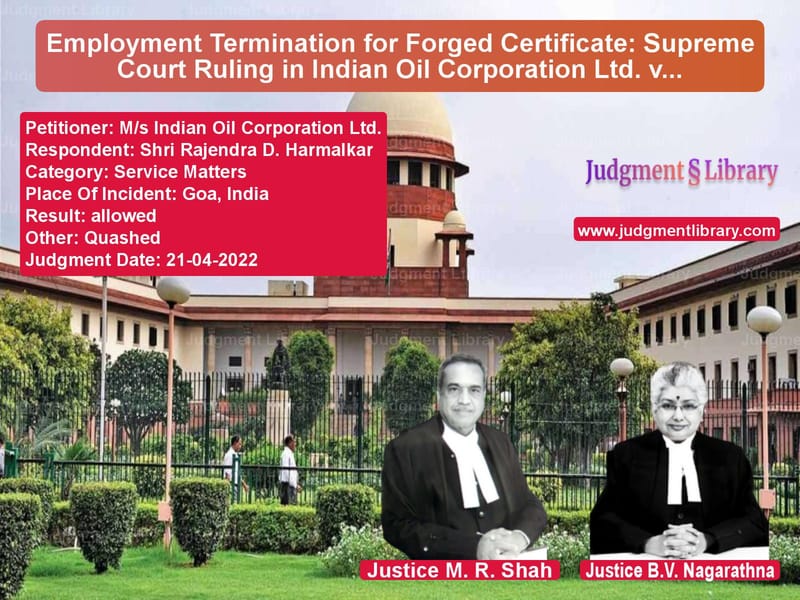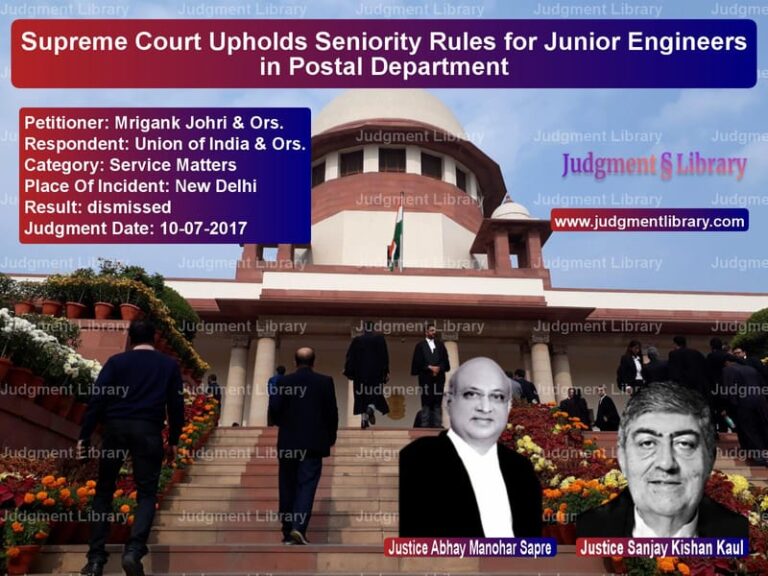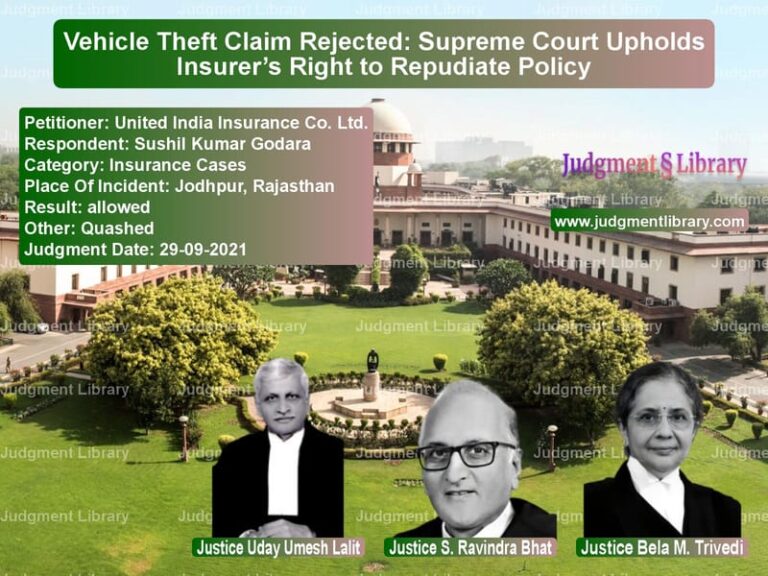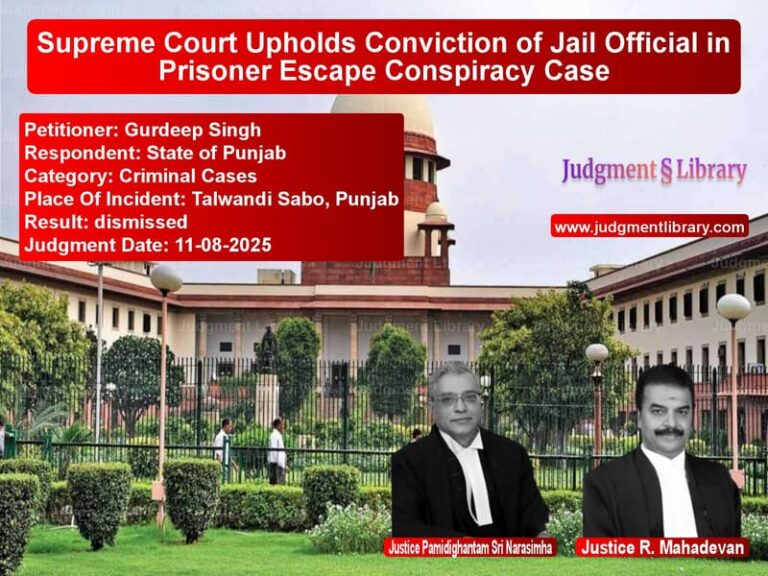Employment Termination for Forged Certificate: Supreme Court Ruling in Indian Oil Corporation Ltd. vs. Rajendra D. Harmalkar
The Supreme Court of India recently addressed an important legal question in the case of Indian Oil Corporation Ltd. vs. Rajendra D. Harmalkar, involving the termination of an employee on grounds of submitting a forged educational certificate. The case revolved around whether an employer, particularly a public sector undertaking, can justifiably terminate an employee for presenting false educational credentials at the time of appointment.
This judgment has far-reaching consequences, reinforcing that integrity and honesty form the cornerstone of employment, especially in government organizations and public sector enterprises. The Court was called upon to determine whether the dismissal of the respondent was appropriate or if leniency could be granted due to his long years of service.
Background of the Case
The respondent, Rajendra D. Harmalkar, was employed by Indian Oil Corporation Ltd. (IOC) as a casual worker in 1986. In 1991, he applied for a permanent position as a Refueling Helper and submitted a Secondary School Leaving Certificate (SSLC) issued by the Karnataka Secondary Education Board as proof of his educational qualification.
Several years later, in 2003, IOC received a complaint alleging that the certificate submitted by the respondent was fraudulent. Upon verification, the Karnataka Secondary Education Board confirmed that the certificate did not belong to him. Following this revelation, IOC initiated a departmental inquiry against the respondent, leading to his termination in 2005.
Arguments by the Petitioner (Indian Oil Corporation Ltd.)
- The respondent secured employment under false pretenses by submitting a forged SSLC certificate.
- Despite multiple requests, he failed to produce the original certificate to substantiate his claim.
- The Karnataka Board confirmed that the certificate was not issued in his name, proving it was forged.
- The respondent, when confronted, admitted to submitting a false document but sought leniency.
- Misrepresentation and fraud justify termination, and continued employment would compromise the organization’s integrity.
Arguments by the Respondent (Rajendra D. Harmalkar)
- The SSLC certificate was not mandatory for the position he was appointed to.
- He had an unblemished service record of more than a decade before the issue surfaced.
- The dismissal was too harsh and disproportionate to the alleged offense.
- The criminal court acquitted him in a separate case concerning the forgery, proving no criminal intent.
- The employer should consider his service record and impose a lesser punishment.
High Court’s Verdict
The High Court of Bombay (Goa Bench) ruled in favor of the respondent, directing his reinstatement without back wages. The court opined that since the forgery was discovered years after his appointment and he had provided satisfactory service, termination was too extreme a punishment.
Supreme Court’s Observations and Ruling
The Supreme Court overturned the High Court’s decision and reinstated the dismissal order, emphasizing the importance of honesty in public service employment.
The key observations made by the Court were:
- Submitting a forged certificate is a serious offense: Employment secured by fraudulent means cannot be allowed to continue, even if discovered years later.
- The passage of time does not absolve fraud: The argument that the misconduct was detected late does not diminish its gravity.
- Trust between employer and employee is fundamental: A public sector organization must uphold integrity and cannot afford to employ individuals who gained employment through deceit.
- High Court overstepped its jurisdiction: The Supreme Court reiterated that courts should not interfere in disciplinary matters unless the punishment is shockingly disproportionate.
The Court stated, “Misconduct involving moral turpitude, such as forgery and misrepresentation, warrants strict action. Employers have the right to enforce stringent measures to maintain discipline and ensure trustworthiness among employees.”
Read also: https://judgmentlibrary.com/supreme-court-rules-on-guest-faculty-employment-rights-and-limitations/
Final Judgment
The Supreme Court ruled that the termination of the respondent was legally justified, and the High Court’s order for reinstatement was quashed. The bench emphasized that submitting false documents at the time of employment is an offense that directly impacts trust and credibility.
The Court concluded that “no leniency can be shown to an employee who indulges in fraudulent practices to secure employment. Even though the respondent served for many years, his employment was based on misrepresentation, and the employer had the right to dismiss him.”
Key Takeaways
- Employers, especially in the public sector, have the authority to terminate employees who secured jobs through fraudulent means.
- Submission of forged documents is a grave offense that cannot be excused by long tenure.
- Courts should not interfere in disciplinary actions unless the punishment is disproportionate.
- This judgment reinforces the principle that public sector organizations must uphold strict ethical standards.
The Supreme Court’s decision in this case serves as a precedent, underscoring the significance of honesty in employment matters and ensuring that individuals who misrepresent their qualifications do not benefit from judicial sympathy.
Petitioner Name: M/s Indian Oil Corporation Ltd..Respondent Name: Shri Rajendra D. Harmalkar.Judgment By: Justice M. R. Shah, Justice B.V. Nagarathna.Place Of Incident: Goa, India.Judgment Date: 21-04-2022.
Don’t miss out on the full details! Download the complete judgment in PDF format below and gain valuable insights instantly!
Download Judgment: ms-indian-oil-corpo-vs-shri-rajendra-d.-har-supreme-court-of-india-judgment-dated-21-04-2022.pdf
Directly Download Judgment: Directly download this Judgment
See all petitions in Employment Disputes
See all petitions in Disciplinary Proceedings
See all petitions in Termination Cases
See all petitions in Judgment by Mukeshkumar Rasikbhai Shah
See all petitions in Judgment by B.V. Nagarathna
See all petitions in allowed
See all petitions in Quashed
See all petitions in supreme court of India judgments April 2022
See all petitions in 2022 judgments
See all posts in Service Matters Category
See all allowed petitions in Service Matters Category
See all Dismissed petitions in Service Matters Category
See all partially allowed petitions in Service Matters Category







